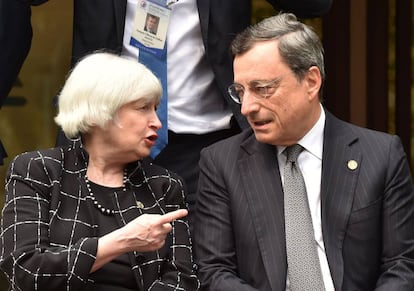Spain tops euro zone for political risk to the economy, says ECB
Central lender expresses concerns that the rise of populism across the continent could rekindle the debt crisis

As if the European economy did not have enough to deal with, with stunted growth levels, a seemingly endless crisis in Greece and a global slowdown, the European Central Bank (ECB) has detected another risk: the populist movements mushrooming across the continent.
In its latest Financial Stability Review, the agency headed by Mario Draghi has alerted that growing popular support for these movements could delay what it views as necessary reforms. And the three countries where the political risk is higher are Spain, France and Greece.
The report comes just one day after an ultraconservative party, the FPÖ, nearly managed to take the presidency in Austria
“Reform implementation may have become more difficult, as political risks have increased considerably in almost all euro area countries since the onset of the global financial crisis,” reads the report, which was released on Tuesday.
“These rising political risks at both the national and supranational levels, as well as the increasing support for political forces which are seen to be less reform-oriented, may potentially lead to the delay of much needed fiscal and structural reforms,” adds the document.
While the ECB does not specifically mention any political parties or countries, a graph illustrating the text and entitled “Political risk ratings in individual euro area countries” shows Spain, France and Greece at the top.
The graph also shows that in the last eight years, political risk has increased in 18 of the 19 members of the euro zone.
Twelve criteria to measure political risk
The conclusion that Spain, France and Greece are the euro zone members with the highest political risk was based on 12 criteria: government stability, socioeconomic conditions, investment profile, internal conflict, external conflict, corruption, number of military serving in public office, regional tension, law enforcement, ethnic tension, democratic accountability and bureaucracy.
The highest political risk levels are attributed to nations where the economic crisis has spawned new political groups on the left (Podemos in Spain and Syriza in Greece) and the right (Front National in France and Golden Dawn in Greece), who question Brussels’ prescription for economic recovery.
“This may cause renewed pressure on more vulnerable sovereigns and potentially contribute to contagion and re-fragmentation in the euro area.” warns the report.
In other words, the ECB is alerting to the risk that the rise of populism might add to the European debt crisis.
The report comes right after an ultraconservative party, the FPÖ, nearly managed to take the presidency in Austria at elections last Sunday. Nationalists were only 31,000 votes shy of their goal, evidencing that the country is politically divided in half.
This is the first time that the ECB’s financial stability report has mentioned populist movements as a risk to the European economy. In Germany, Deutsche Bank did something similar when it issued a report last year that mentioned right and left-wing movements in Germany, Britain, Finland, France, Italy, The Netherlands, Austria, Greece and Spain. Although these parties defend very different policies when it comes to issues such as immigration, they all share a rejection of “new measures towards European integration.”
English version by Susana Urra.
Tu suscripción se está usando en otro dispositivo
¿Quieres añadir otro usuario a tu suscripción?
Si continúas leyendo en este dispositivo, no se podrá leer en el otro.
FlechaTu suscripción se está usando en otro dispositivo y solo puedes acceder a EL PAÍS desde un dispositivo a la vez.
Si quieres compartir tu cuenta, cambia tu suscripción a la modalidad Premium, así podrás añadir otro usuario. Cada uno accederá con su propia cuenta de email, lo que os permitirá personalizar vuestra experiencia en EL PAÍS.
¿Tienes una suscripción de empresa? Accede aquí para contratar más cuentas.
En el caso de no saber quién está usando tu cuenta, te recomendamos cambiar tu contraseña aquí.
Si decides continuar compartiendo tu cuenta, este mensaje se mostrará en tu dispositivo y en el de la otra persona que está usando tu cuenta de forma indefinida, afectando a tu experiencia de lectura. Puedes consultar aquí los términos y condiciones de la suscripción digital.









































